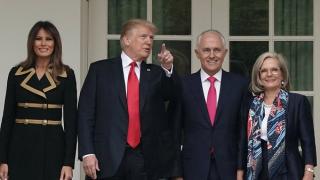Washington crawled with Australians for three days, with the visit of the largest and most senior Australian political and business delegation ever to visit. In addition to the Prime Minister and Trade Minister, four state premiers and two chief ministers were in town, along with a wide array of business leaders.
Just 13 months into the Trump administration, it is remarkable that this marked the fourth time Turnbull and Trump have met, a high tempo of engagement under any circumstances, and all the more remarkable given the shaky start to their relationship.
Just 13 months into the Trump administration, it is remarkable that this marked the fourth time Turnbull and Trump have met, a high tempo of engagement under any circumstances, and all the more remarkable given the shaky start to their relationship.
Bringing a delegation this large and diverse to Washington is a high point in a deliberate strategy by the Australian government to deepen its engagement with the US. Just hours after Trump's surprise election win in November 2016, Kim Beazley advocated Australia "doubling down" on its relationship with the US. Beazley – Australia's ambassador to the US from 2010 to 2016 – made the remarks as surprise was giving way to anxiety as to what "America First" might imply for Australia.
The context and the stakes were high, and continue to be so. Balancing Australia's relationships with both the US and China is the single most pressing issue in Australian strategic thinking and in the conduct of Australian foreign policy, a lens through which almost all of Australia's international engagement is filtered. Would "America First" see a deterioration of US-China relations that would wedge Australia, precisely the outcome that Australian foreign policy has been singularly focussed on avoiding?
"Doubling down" on the US relationship has not been an unthinking or sentimental exercise. Australia has been assertive, clear-eyed and creative in managing the US relationship under Trump. In a way that a Clinton win might not have done, Trump's win prompted considerable Australian introspection about the US-Australia relationship. The Australian government's recently released foreign policy white paper reveals the intensity of that self-interrogation, its opening chapters articulating the principles that motivate Australian foreign policy, its conclusions reaffirming that the US relationship remains the bedrock of Australia's defence strategy and foreign policy.
The Australian government's engagement strategy in the US has followed suit. The defence and intelligence relationship remains intensely close. Turnbull's first 24 hours in Washington were dominated by defence and intelligence meetings and briefings. The Australian Embassy in Washington has put the military alliance front and centre in its public diplomacy, prominently celebrating "100 years of mateship", powerfully reminding Americans that Australians and Americans have fought together in every major conflict since World War One.
Australians are sometimes embarrassed by overt displays of patriotism. But Hockey and the Australian diplomatic team in Washington have discovered that "100 years of shared sacrifice" works a treat – across the political divide in the US – granting Australia considerable moral authority to press the case on other matters.
Australians are sometimes embarrassed by overt displays of patriotism. But Hockey and the Australian diplomatic team in Washington have discovered that "100 years of shared sacrifice" works a treat – across the political divide in the US – granting Australia considerable moral authority to press the case on other matters.
"Doubling down" has seen a renewed appreciation of the depth of the trade and investment relationship between the US and Australia. Australian ministers now routinely refer to the US as Australia's most important economic partner, recognising that the US is the largest source of foreign investment in Australia and that conversely, the US is the single largest destination for Australian capital heading offshore. Cumulatively, two-way investment between the US and Australia is valued at more than $1.4 trillion.
The economic relationship was the big agenda item for the Australian delegation. Australian CEOs reported business confidence in the US being as good as they've ever seen, largely due to Trump's corporate tax cuts. Australian institutional investors see tremendous opportunity in the US as economic growth continues and American governments – both federal and state – turn their attention to rebuilding infrastructure.
Ambassador Hockey and the Australian Embassy diplomats pulled off a coup, securing top billing in the program of the National Governors Association meeting. A keynote speech from Turnbull and a round table between state governors and premiers was the opening act.
State governments are not only more plentiful in the US than in Australia, but more autonomous. Not enough Australians appreciate how much policy and economic decision-making happens in US state capitals. Australian state premiers – especially NSW's Berejiklian and Victoria's Andrews – attested to the way that asset privatisation and public-private partnerships have enabled infrastructure provision in their jurisdictions; there was genuine curiosity from the American governors and guarded optimism from Australian institutional investors.
Yet in all of this – the elephant in the room is China. In response to a question from The Australian Financial Review's Phil Coorey, Trump both referred to Xi Jinping as his good friend and to the US getting tougher on trade with China, as perhaps only Trump can. Australian political leaders – Turnbull included – have engaged in careful parsing of the US National Security Strategy's reference to China as a "strategic threat".
There is also a growing understanding that US policy towards China was going to get more robust no matter who won the 2016 election, reflecting frustration and anxiety about China across the US political spectrum.
The world Australia navigates is not so simple as "America, our defence ally; China our ticket to prosperity" and Turnbull is right to insist we're not back in the Cold War. One the one hand, Australia never ran a $20 billion trade surplus with the USSR; on the other hand, trade and investment with China does come with strings attached, extending into non-commercial domains.
"Doubling down" on the US-Australia relationship – as deep and multi-faceted as it is – gives Australia not just a security hedge against an uncertain future, but an economic hedge too.






